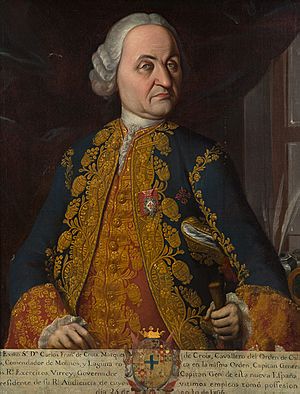Carlos Francisco de Croix, 1st Marquess of Croix facts for kids
Carlos Francisco de Croix, 1st Marquess of Croix (born in Lille, Flanders in 1699 – died in Valencia, Spain in 1786), was an important Spanish general. He served as the viceroy of New Spain (which is now Mexico) from August 25, 1766, to September 22, 1771. This was a time of many big changes and challenges in the colony.
Becoming Viceroy of New Spain
Carlos Francisco de Croix had a long career in the Spanish army. He rose through the ranks to become a general. Before becoming viceroy, he was in charge of the military base in Ceuta, a Spanish city in Africa. Later, he was the captain general of Galicia in Spain.
In 1766, he was chosen to be the new viceroy of New Spain. He took over from Joaquín de Montserrat. De Croix arrived in Veracruz on July 10, 1766. He officially started his role as viceroy in Mexico City on August 25, 1766. His nephew, Teodoro de Croix, who would also become an important leader later, came with him as the captain of the viceroy's guards.
Viceroy de Croix believed strongly in following the king's orders without question. He always called the king "mi amo," which means "my master."
Expelling the Jesuits
One of the most important things Viceroy de Croix did was to expel the Jesuits from New Spain. The Jesuits were a powerful group of Catholic priests and scholars. This happened on June 25, 1767. The king of Spain, Charles III, ordered this.
De Croix worked with an inspector named José de Gálvez to carry out the order. Soldiers were used to remove the Jesuits from their churches and schools. They were allowed to take very few belongings and were sent to Italy. Some famous Jesuit scholars, like Fathers Andrés Cavo, Francisco Javier Clavijero, and Francisco Javier Alegre, were among those expelled. The College of San Ildefonso, a major school, was closed.
This decision made many people in New Spain very upset. There were protests and even rebellions in cities like Guanajuato and Pátzcuaro. The viceroy and the inspector acted strongly to stop these uprisings. Viceroy de Croix made it clear that people should obey the king's decisions without question. He said that people were "born to be silent and obey and not to discuss, nor to comment on the high affairs of the government."
During this time, differences between Criollos and Peninsulares became more noticeable. Criollos were people of European descent born in New Spain. Peninsulares were people born in Spain. The unrest during the Jesuit expulsion led to some conflicts between these groups.
The king also supported the Inquisition, a religious court, at this time. Some other religious leaders began to speak out against the government. Viceroy de Croix warned them not to get involved in government matters. He even stopped a newspaper called Diario Literario because he thought it might cause problems, even though it only had articles about literature and science.
Other Events During His Time
- Dealing with Native American Uprisings: The Pima and Seri Native American groups had started to rebel again. Viceroy de Croix sent soldiers to the region of Sonora to stop the fighting in 1767. Inspector Gálvez also traveled to this area and to California to help protect the colony from possible threats from the north.
- New Schools and Hospitals: In 1768, a royal order created a college of surgery in the Royal Hospital in Mexico City. This was an important step for medical education.
- Arrival of Spanish Troops: To help defend the colony, especially against the English, many soldiers arrived from Spain. About 10,000 soldiers came in different groups. They were known as blanquillos because of their white uniforms.
- Mining Issues: There were also problems in the mines of Guanajuato and Pachuca. Miners were unhappy with their low wages. Viceroy de Croix helped the mine owners and miners agree on better wages.
- New Lottery and Education: In 1769, de Croix started a lottery, which brought a lot of money to the government. In 1770, he worked to teach Spanish to Native Americans by building special schools.
- Building Projects: He ordered the construction of the castle of San Carlos in Perote, Veracruz. This castle was built to defend the coast. He also made the Alameda, a large park in Mexico City, twice as big.
- Religious Council: In 1771, he opened the fourth Council of Mexico for the Catholic clergy. However, its decisions were never fully approved.
Viceroy de Croix asked for his salary to be increased, and it was. He also brought French styles and French food to New Spain.
On September 2, 1771, Carlos Francisco de Croix handed over his position to Antonio María de Bucareli y Ursúa. He then returned to Spain. King Charles III made him captain general of Valencia, where he died a few years later.
See also
 In Spanish: Carlos Francisco de Croix para niños
In Spanish: Carlos Francisco de Croix para niños
 | Charles R. Drew |
 | Benjamin Banneker |
 | Jane C. Wright |
 | Roger Arliner Young |


